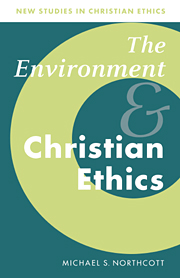Book contents
- Frontmatter
- Contents
- General editor's preface
- Preface
- Acknowledgements
- 1 Frogs, floods and famines
- 2 The origins of the environmental crisis
- 3 The turn to nature
- 4 The flowering of ecotheology
- 5 The order of creation
- 6 Creation, redemption and natural law ethics
- 7 Natural law and ecological society
- Notes
- Index
- New Studies in Christian Ethics
7 - Natural law and ecological society
Published online by Cambridge University Press: 07 October 2009
- Frontmatter
- Contents
- General editor's preface
- Preface
- Acknowledgements
- 1 Frogs, floods and famines
- 2 The origins of the environmental crisis
- 3 The turn to nature
- 4 The flowering of ecotheology
- 5 The order of creation
- 6 Creation, redemption and natural law ethics
- 7 Natural law and ecological society
- Notes
- Index
- New Studies in Christian Ethics
Summary
THE TECHNOLOGICAL SOCIETY
The modern social form may be most accurately characterised, as Jacques Ellul proposes, as a technological society. The domination of techne according to Ellul, occurs not just in relation to the domination of machines, but in relation to the powers of technical, statist and corporatist processes by which central human ends – work, play, religion, family – are converted into means to ends, the principal ends being economic efficiency and the technological servitude of the state and the corporation. The social transformations involved in the technological society are essentially to do with the transformation of social power, and its relocation from families, tribes and local communities, where nature's wealth and human productivity were located in the pre-modern world, to the landowner, the corporate manager and the rulers or servants of the state. Technology, and the economy of money which is its supreme manifestation, achieves an autonomy from divine command, from human community and from natural order, eliminating moral value and spiritual significance along with natural necessity.
The technological domination of modern life therefore involves a threefold subversion of human flourishing as religion, human community and nature are all transformed and corroded by the social power which is mobilised in the pursuit of technological progress and prowess.
- Type
- Chapter
- Information
- The Environment and Christian Ethics , pp. 257 - 327Publisher: Cambridge University PressPrint publication year: 1996



